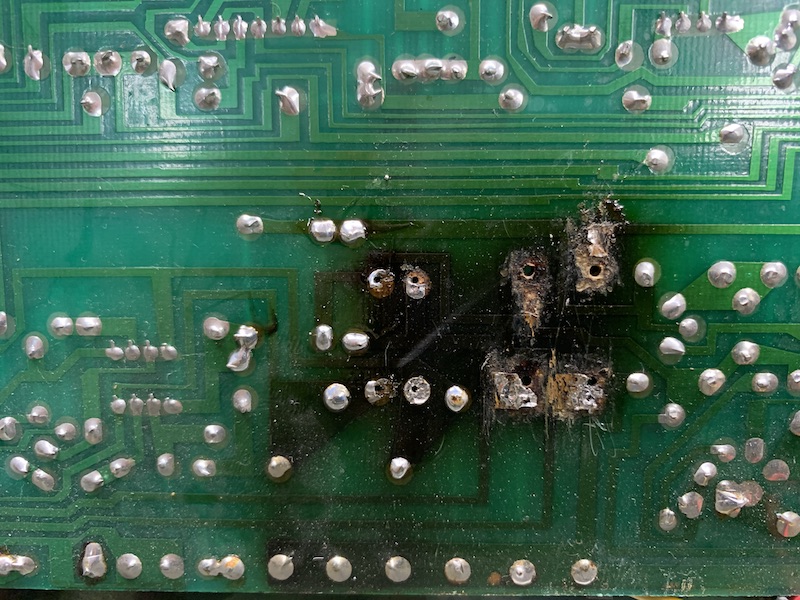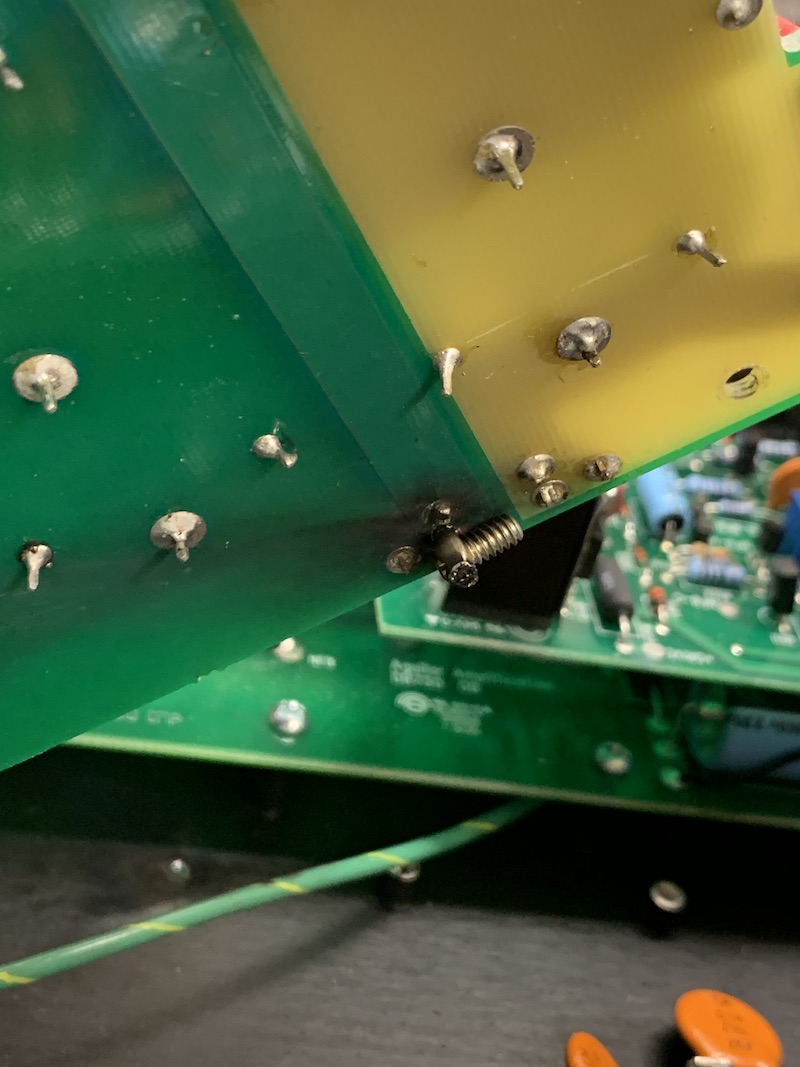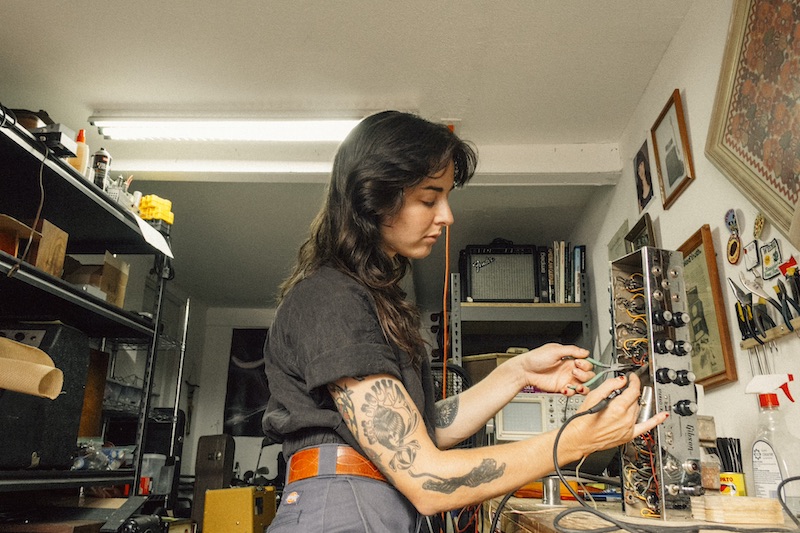To many of us, spending our days with holy-grail vintage tube amplifiers is a dream. Since the inception of the electric guitar amplifier in late ‘40s, these pieces of gear have endured decades of use.
Those who purchase a vintage amp today can't be entirely sure of its history. How many owners has the amp had? Has it been toured with extensively? Are all (or any) of the parts original? But what we often overlook is the repair techs who made it possible for the amp to survive decades of usage.
We connected with LA-based amp builder and repair technician Colleen Fazio to discuss the most difficult aspects of her work.
After graduating high school, Fazio learned to repair vintage tube amplifiers, inspired by two of her uncles who build Vero Amps. After taking amp and guitar repair classes at the Chicago School of Guitar Making, she got a job at Deltronics audio repair shop in the suburbs of Chicago (Woodridge, IL) where she was mentored by the shop owner Mike Delvalle. In 2019 she moved to LA and established her custom amp company, Fazio Electric.
Fazio’s path helped her realize how inaccessible education on vintage amp circuitry and vacuum tubes can be. To share her knowledge, she began to chronicle some of her repair jobs on YouTube in late 2020. Since then, Fazio has gone viral in the amp repair world. In the last five months alone, her YouTube channel has grown from 5k to 35k subscribers. As a result, a new influx of national customers willing to ship their amps, plus Los Angeles locals, have increased demand for Fazio’s work.
Despite her passion for working with amplifiers, there are many risks involved in accepting tube amplifiers that need repair. Beyond the fire hazard they can pose, she reveals that guitarists leave behind shocking things (dead... and alive) in their amplifiers.
What is the most botched and hazardous piece of gear you have received?
The worst of the worst are actually amps built by other people and sent to me. I don't really take in homemade amps for repair anymore because I've had such bad experiences where people have built amps with issues—like really dangerous high-voltage components a millimeter away from grounding on the chassis, so they're about to short, which could cause a big explosion.
Recently, somebody built an amp with bad parts—capacitors were leaking, there were wires almost touching places they shouldn't be touching.


And in that case, what I'm doing is just completely gutting it and rebuilding it because there's no way I would, in my right conscience, be able to give that amp back as it is. I could fix it and give it back as is, but it's just going to be so dangerous still. So in that instance, my approach is just to completely rebuild it for them.
How do you suggest people start to experiment with amp-building?
People should build kits if they want to get into amps. Even effects pedals kits are a great way to go, and they're kinda foolproof to a degree—they're relatively safe. But, it's the people who try to build an amp with parts they have lying around, stuff like that. I'm not wanting to discourage anybody from doing it, but you have to be aware of where the high-voltage is and make sure it's isolated and not going to short against anything.
Also, I can't deal with cockroaches in amps. The worst time was when I was working on this Deluxe Reverb Reissue and, I saw some dead bugs in the bottom of the cabinet, and I was like, "Okay, whatever, no big deal." But then I took the amp apart, and inside the chassis, there was this dead roach. Well, at least I thought it was dead! I went to get it out, and it started running. I was like, "Okay, I'm fucking done for the day."
I really deal with a lot of nasty shit. Like rat poop. Even rat urine in amps. You can just smell it, and it's so nasty. All of that gross stuff, I've just had to learn to deal with and clean it out and stuff.
So the client with the Deluxe Reverb that had a roach in it—did you tell them? Will you accept more amps for repair from them in the future?

There was one person I just didn’t tell because I really liked them as a person, and I didn't want to embarrass them. But if it's somebody I don't know, I will have no problem with telling them. If I open it up and there's a roach in there, I won't fix it.
You're implying that more than one person has brought you an amp with a live cockroach in it...
Yes! And the worst is when the roach gets out, and I didn't realize there was one in there. It runs out of the amp, and I have to spend the next hour running around and finding it because I don't want it in my shop.
What's your dream object to find in an amp?
I would love to get an amp that somebody found in their grandpa's attic, and it's from the '40s, and it has an envelope of cash in it. That would be sick. But, you know, a girl can dream.
Would you tell them?
That's a good question. I would like to think that I would. I'm a good person, I swear.
As you start to limit the number of repairs you take in, are you hoping to transition full time into building Fazio Electric amps?
Building is my first love, and that's how I got into this. That's my inspiration. I've just gotten so overloaded with repairs that I haven't been able to build an amp in a long time. This week, I actually started limiting the repairs I take in and the types of amps I take in, so I can hopefully catch up my repairs and then start building more frequently.
It does get to a point where I want to balance it out a bit more and, you know, it's good for my own well-being, too—to just mellow it out a little bit and build amps. Because when I build, I can just kinda space out and build it, and I'm not racking my brain trying to fix something.

A Few of Colleen's Dos and Don’ts for Amp Health
Putting your amp on standby when you're turning your amp on and off?
DO! It's gradual power on and off, it's not a complete shock to it.
Keeping your tube amp in a cold car overnight (or a hot car)?
DON'T! If you're on tour and staying in a hotel, bring it in the hotel with you.
Replacing a tube with no repair experience?
DON'T! I've seen people do this and they put it in the wrong way. Then they turn the amp on and it blows the power transformer. You can do it, obviously, but I would suggest having a repair tech do it. If you're replacing your output tubes, always make sure they get biased. Always have a tech bias them.
Buying and using a vintage amp that hasn't been checked by a tech first?
DON'T! Of course, it's case-to-case, but you never know what's gonna happen.
- Tom Currie (Detroit, MI)
- Luke Single (Fallston, MD)
- Revamp, Andy Arahood (Oakland, CA)—This is who Colleen worked for when she first moved to LA. He's since moved Revamp up to Oakland.
- Deltronics, Mike Delvalle (Woodridge, IL and Chicago, IL)—Colleen got her start at the Woodridge spot.

